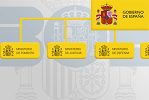Contracts. Salary. Self-employment
Content
Types of employment contract
Employment contracts are governed by the Workers’ Statute (ET).
In terms of duration, employment contracts may be:
- Permanent/indefinite
- An employment contract is presumed to be for an indefinite period ( Article 15(1)
 ) .
) . - A permanent seasonal contract ( Article 16 ).
- Temporary/fixed-term
- For reasons of production fluctuations ( Article 15(2) ).
- To replace workers entitled to keep their job, provided that the employment contract states the name of the replaced worker and the reason for the replacement ( Article 15(3) ).
In terms of working hours, contracts may be:
- Full-time
- Part-time ( Article 12 )
The Workers’ Statute also provides for the following other forms of employment contract: ( Articles 10–13 )
- Joint work and group contracts ( Article 10 )
- Training contracts ( Article 11 )
- Dual learning contracts ( Article 11(2)
 )
) - Training contracts for obtaining work experience ( Article 11(3))

- Part-time and relief contracts
 (Article 12
(Article 12 )
) - Remote working (
 Article 13 of the Workers’ Statute and Law 10/2021 of 9 July on remote working ).
Article 13 of the Workers’ Statute and Law 10/2021 of 9 July on remote working ).
The Labour Guide provides information about the characteristics of each type of contract.
Contracts signed before 31 December 2021
These contracts are subject to the transitional arrangements, regulated in Royal Decree-Law 32/2021 of 28 December, on urgent measures for labour reform, ensuring stable employment and transforming the labour market .
-
Fixed-term contracts concluded before 31 December 2021 (3rd TD)
1. Contracts for specific works and services based on the provisions of Article 15(1)(a) of the Workers’ Statute, according to the wording in force before the entry into force of Article 1(3), concluded before 31 December 2021, as well as fixed contracts for works concluded under Article 24 of the VI National Agreement on Construction, in force on that date, will be applicable until their maximum duration, under the terms set out in those provisions.
Similarly, specific works or service contracts concluded by public administrations and their associated or governed public bodies, provided for in legislation with the status of law, that are linked to a specific research or investment project with a duration of more than three years and in force on the date referred to in the previous paragraph, will remain in force until the end of the period fixed in accordance with the applicable legislation, subject to a maximum limit of three years from said date.
2. Temporary contracts arising from market circumstances, an accumulation of tasks or an excess of orders and interim contracts based on the provisions of Article 15(1)(b) and (c) of the Workers’ Statute, respectively, concluded in accordance with the wording in force before the entry into force of Article 1(3), will be regulated up to their maximum duration by the wording of said provisions.
3. Workers will be in a legal situation of unemployment when the contracts referred to in the previous paragraphs are terminated following the expiry of the agreed period or completion of the work or service that is the object of the contract, provided that these causes are not the subject of complaint.
-
Transitional regime on limits on successive contracts (5th TD)
The provisions of the wording of this Royal Decree-Law to Article 15(5) of the Workers' Statute will apply to employment contracts entered into after this Royal Decree-Law enters into force.
With regard to previously signed contracts, for the purposes of calculating the number of contracts, the period and duration provided for in the aforementioned Article 15(5), only contracts in force when this Royal Decree-law enters into force will be taken into consideration.
Content of employment contracts
The contracts will contain the following information:
-
The names of the parties to the employment contract.
-
The starting date of the employment relationship, and in the case of a temporary relationship, its foreseen duration.
-
The registered office of the company or, as the case may be, the address of the employer and the workplace where the worker will normally provide their services. When the worker normally provides their services in different workplaces or in mobile or itinerant workplaces, it is necessary to record such circumstances.
-
The professional category or group for the job carried out by the worker or the characterisation or a brief description of the same, in terms that make it possible to know in sufficient detail the specific content of the work.
-
The amount of the initial basic salary and wage benefits, and their payment frequency.
-
The duration and distribution of the normal working hours.
-
The duration of the holiday leave and, as applicable, the methods used to allocate and determine such holiday leave.
-
The notice periods that the employer and worker are obliged to comply with in the event of the contract termination, or if it is not possible to provide this information at the time of delivering the information, the manner in which such notice periods are determined.
-
The collective agreement applicable to the employment relationship, describing the specific data that enables its identification.
This matter is regulated by Royal Decree 1659/1998 of 24 July 1998 implementing Article 8(5) of the Workers’ Statute Act on informing workers about the basic elements in their employment contracts![]() .
.
Salary
What is meant by salary?
Salary refers to all the economic benefits paid to workers, in cash or in kind, in return for the professional provision of their services as salaried workers, whether paid for effective work, regardless of the remuneration methods, or in the form of rest periods that count as working time.
Under no circumstances, including special employment relationships, may the salary in kind exceed thirty per cent of all the salary benefits of the worker, nor may it give rise to the amount received in cash being less than the minimum guaranteed interprofessional wage.
The following items are not considered as salary:
-
amounts received by the worker as compensation or substituted by expenses incurred as a consequence of their professional activity;
-
Social Security benefits and compensation and
-
indemnities paid in the event of transfer, suspension or dismissal.
The above is regulated in Article 26 of the Workers’ Statut![]() e.
e.
For more information, consult the Labour guide.![]()
Minimum and average salary
The minimum guaranteed interprofessional wage is that set by the Government, after consultation with the most representative trade unions and employer associations. No worker who works a full time may receive a salary that is less than the minimum guaranteed interprofessional wage.
The average salary is the result of the statistical salary analysis; there is no legal concept of average salary.
This matter is regulated in Article 27 of the Workers’ Statute![]() .
.
For more information, consult the Labour Guide![]() .
.
What are the decisive factors used to establish the salary?
To establish the annual minimum guaranteed interprofessional wage, the following factors are taken into account:
-
The Consumer Prices Index.
-
The average national productivity.
-
The increase of the share of labour in the national income.
-
The overall economic outlook.
This matter is regulated in Article 27 of the Workers’ Statute![]() .
.
For more information, consult the Labour Guide![]() .
.![]()
Self-employment
These are individuals who normally carry out an economic or a professional activity in return for a profit personally, directly, on their own account and outside the scope of the management and organisation of another person, whether or not they provide employment to salaried workers.
The Labour Guide provides information relating to:
-
The Self-employment Statute approved by Law 20/2007 of 11 July
 : rights, obligations, etc.
: rights, obligations, etc. -
The promotion of self-employment
 : advice on grants, rebates, etc.
: advice on grants, rebates, etc. -
The Special social security system for free-lance or self-employed workers
 .
. -
The formalities required to start up the activity and work as a self-employed person
 .
.
Información por Comunidades Autónomas




Andalucía Aragón Asturias, Principado de Balears, Illes Canarias Cantabria Castilla y León Castilla-La Mancha Cataluña Ciudad de Ceuta Ciudad de Melilla Comunitat Valenciana Extremadura Galicia Madrid, Comunidad de Murcia, Región de Navarra, Comunidad Foral de País Vasco Rioja, La
Legal and/or technical references
-
Royal Decree-Law 32/2021 of 28 December, on urgent measures for labour reform, ensuring employment stability and transforming the labour market.

-
Royal Legislative Decree 2/2015 of 23 October approving the recast text of the Workers’ Statute

-
Royal Decree 1659/1998 of 24 July 1998 implementing Article 8(5) of the Workers’ Statute Act on informing workers about the basic elements in their employment contracts

-
Labour Guide











